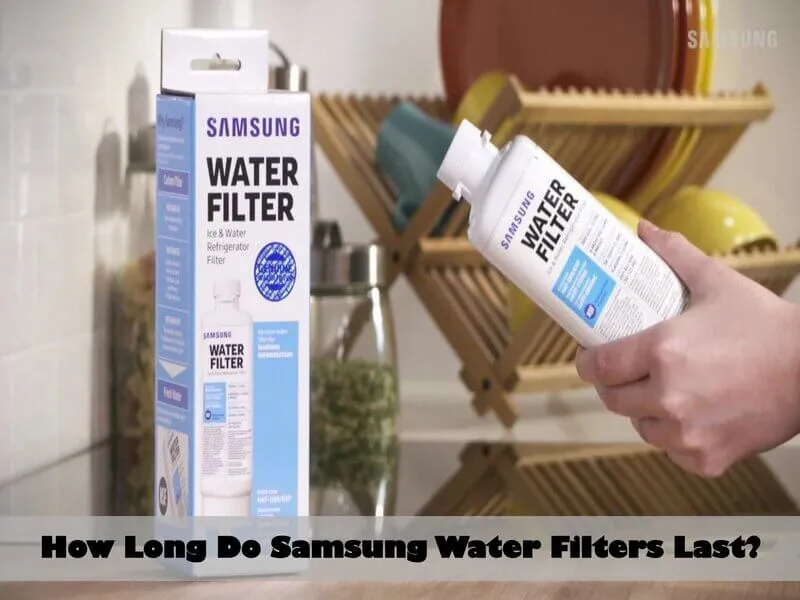When investing in a household appliance like a refrigerator, one of the key considerations is its lifespan. Samsung, a renowned brand in the electronics industry, offers a wide range of refrigerators known for their innovation and quality. But how long can you expect a Samsung refrigerator to last?
Samsung Refrigerators typically last for 10-15 years. However, if maintained and taken care of extensively, the lifespan could definitely be extended.
In this article, we’re going to take a deeper look into how long do Samsung refrigerators last, the factors that influence the lifespan of Samsung refrigerators, the average duration you can anticipate and tips to extend their longevity.
Table Of Contents
- How Long Do Samsung Refrigerators Last on Average?
- Factors Affecting Samsung Refrigerator Lifespan
- Tips to Extend the Lifespan of Your Samsung Refrigerator
- How Long Do Samsung Refrigerator Water Filters Last?
- How Long Do Samsung Refrigerator Compressors Last?
- Is it Worth Repairing or Replacing a Samsung Refrigerator?
- Frequently Asked Questions
- Final Thoughts

How Long Do Samsung Refrigerators Last on Average?
The exact lifespan of a Samsung refrigerator is influenced by several factors such as age, size, type, condition, usage etc.
The average lifespan of a modern Samsung refrigerator is typically around 10 to 15 years. Nonetheless, high-end models with premium features and technological advancements can easily surpass this average up to 20-25 years if properly maintained and annually serviced.
How Long Do Samsung French Door Refrigerators Last?
On average, under normal circumstances, Samsung French Door refrigerators may last anywhere between 10-15 years. However, with regular maintenance, such as cleaning coils, replacing worn-out parts and regular defrosting, can help extend its life further.
How Long Do Samsung Side-by-side Refrigerators Last?
According to customer reviews’ and feedback, Samsung Side-by-side refrigerators, like other models, typically last longer than 10 years. For some people who ensured proper care, their refrigerator models survived for as long as 15-20 years. Factors like usage, maintenance, and the quality of the specific model can influence how long a Samsung Side-by-side Refrigerator will last.
Factors Affecting Samsung Refrigerator Lifespan
Knowing the factors that negatively impact refrigerator lifespan will help you be cautious and mindful of your appliance’s health. Here’s a list of all such factors:
Tips to Extend the Lifespan of Your Samsung Refrigerator
If you want your fridge investment to last a long time, here are some useful maintenance tips you can explore.
How Long Do Samsung Refrigerator Water Filters Last?

The lifespan of a Samsung refrigerator water filter can vary depending on several factors. While the manufacturer generally recommends replacing the water filter every 6 months or after 500 gallons, there are variables that can influence how long a filter lasts:
To ensure that you’re getting the best performance and water quality from your Samsung refrigerator’s water filter, it’s advisable to follow the manufacturer’s recommendations for replacement intervals.
However, if you notice a significant decrease in water flow, a change in water taste or odor, or if the filter indicator prompts you to replace the filter, it’s a good idea to replace the filter as soon as possible and not wait for 6 months to pass.
How Long Do Samsung Refrigerator Compressors Last?
On average, a refrigerator compressor can last anywhere from 10 to 20 years. The lifespan could be way shorter or even longer than that depending on maintenance, usage, compressor running time, material quality etc. High-quality compressors tend to have a longer lifespan than lower-quality ones.
Firstly, the frequency of use and the demands placed on the compressor can affect its lifespan. If the refrigerator is constantly running due to high usage, the compressor might wear out sooner.
Furthermore, voltage fluctuations and electrical malfunctions can negatively affect the compressor. Using a voltage stabilizer or surge protector can help protect the compressor from voltage-related damage.
Additionally, the operating environment can impact the compressor’s longevity. If the refrigerator is placed in an area with high temperatures or humidity, the compressor might need to work harder, potentially shortening its lifespan.
If you’re regularly cleaning the back area where the compressor is located and protecting it from dirt and debris and bug infestations, your compressor will lead a long life.
Is it Worth Repairing or Replacing a Samsung Refrigerator?
Deciding whether to repair or replace a Samsung refrigerator depends on several factors, including the extent of usage, its age, condition and the cost of repair versus replacement. Here’s a breakdown to help you make an informed decision:
When to Consider Repairing:
- Cost of Repair: If the repair cost is significantly lower than the cost of a new refrigerator, it’s usually worth repairing. A general rule is that if the repair costs are less than half the price of a new appliance, repair is a reasonable option.
- Age of the Refrigerator: If your Samsung refrigerator is relatively new and still under warranty, it’s likely a good idea to repair it, especially if the repair is covered by the warranty.
- Minor Issues: If the problem is a minor, fixable issue such as a faulty thermostat, a broken seal, or a malfunctioning fan, repairing is often a practical choice.
- Sentimental Value: If you have a sentimental attachment to the refrigerator or if it has unique features that you can’t find in newer models, repairing might be a good option.
When to Consider Replacement:
- Age of the Appliance: If your Samsung refrigerator is already close to or past its expected lifespan (around 10-15 years), it might be more cost-effective to replace it, as older appliances are more likely to develop more issues over time.
- Major Repairs: If the repair involves a major component such as the compressor or cooling system, it could be expensive. In such cases, you might be better off investing in a new refrigerator that comes with a warranty.
- Energy Efficiency: Older refrigerators tend to be less energy-efficient than newer models. If your current refrigerator is consuming a lot of energy, you could save money in the long run by replacing it with a more energy-efficient one.
- Frequent Repairs: If your Samsung refrigerator has been requiring frequent repairs, the cumulative costs might make it more sensible to replace it, especially if it’s already several years old.
You should consult a professional technician to assess the condition of your refrigerator and provide an estimate for repairs. They can help you decide whether the repair is worthwhile. You should also compare the cost of repair (including potential future repairs) with the cost of a new refrigerator with similar features.
Don’t forget to consider your future plans. If you’re planning to move or renovate your kitchen in the near future, it might make sense to wait and replace the old refrigerator for a new one.
All in all, the decision to repair or replace your Samsung refrigerator should be based on a combination of all these factors to create a balance between immediate costs and long-term benefits.
Frequently Asked Questions
What Are the Signs That My Samsung Refrigerator Might Be Reaching the End of Its Lifespan?
Signs include frequent breakdowns, inefficient cooling, excessive noise, food Spoiling quickly or if it’s nearing the 10 to 15-year mark. These can indicate that the refrigerator might be nearing the end of its usable life.
What’s the Role of Warranty in Determining the Refrigerator’s Lifespan?
If your Samsung refrigerator is still under warranty, it might make sense to repair it rather than replace it. Warranties generally cover most repairs and replacements. It’s better to contact Samsung Customer Helpdesk to get more info in this regard.
Is It Better to Invest in a More Expensive Samsung Refrigerator for Longevity?
While price can reflect top-notch quality and higher durability to some extent, other factors like maintenance and usage also influence lifespan. Consider your budget and the features that matter most to you before investing.
Can Extreme Temperatures in My Kitchen Affect the Lifespan of My Samsung Refrigerator?
Yes, placing your refrigerator in an environment with extreme heat or cold can affect its performance and lifespan. Keep it in a temperature-controlled area. The ideal kitchen temperature for placing a refrigerator is between 60°F (15.6°C) and 75°F (23.9°C). Avoid placing the refrigerator near heat sources like ovens, stoves, or direct sunlight.
Final Thoughts
Let’s do a quick recap! The average lifespan of Samsung refrigerators can vary based on factors such as build quality, usage, maintenance, and environmental conditions. While the average lifespan of other modern refrigerators is around 10 to 12 years, Samsung’s advanced technology and high durability can extend this timeframe.
By following proper maintenance practices, setting appropriate temperatures, and regularly cleaning the back unit and internal spaces, you can ensure that your Samsung refrigerator serves you well beyond the average lifespan. Remember, a well-maintained refrigerator not only saves you money but also contributes to a sustainable and efficient household.
